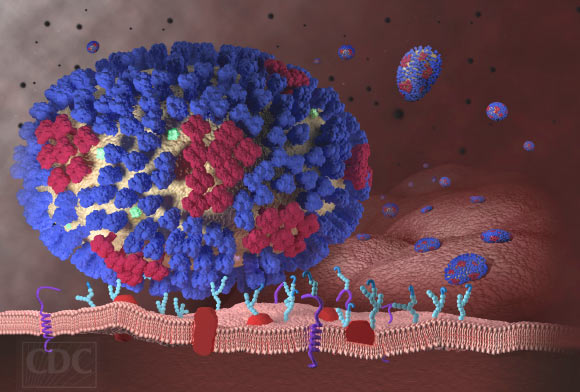A new study led by Professor Akiko Iwasaki of the Howard Hughes Medical Institute and Professor Vishwa Deep Dixit from Yale School of Medicine shows that the consumption of a low-carbohydrate, high-fat ketogenic diet — which for people includes meat, fish, poultry, and non-starchy vegetables — protects mice from influenza A virus infection.

This image illustrates the beginning stages of an influenza infection and shows what happens after the influenza viruses enter the human body. Image credit: Centers for Disease Control and Prevention.
“The ketogenic diet activates a subset of T cells in the lungs not previously associated with the immune system’s response to influenza, enhancing mucus production from airway cells that can effectively trap the virus,” the researchers said.
“This was a totally unexpected finding,” Professor Iwasaki added.
Previously, the scientists had found that immune system activators called inflammasomes can cause harmful immune system responses in their host.
They also had found that the ketogenic diet blocked formation of inflammasomes.
In the new study, the researchers showed that mice fed a ketogenic diet and infected with the virus had a higher survival rate than mice on a high-carbohydrate normal diet.
Specifically, they found that the ketogenic diet triggered the release of gamma delta T cells, immune system cells that produce mucus in the cell linings of the lung — while the high-carbohydrate diet did not.
When mice were bred without the gene that codes for gamma delta T cells, the ketogenic diet provided no protection against the influenza virus.
“This study shows that the way the body burns fat to produce ketone bodies from the food we eat can fuel the immune system to fight flu infection,” Professor Dixit said.
The results were published in the journal Science Immunology.
_____
Emily L. Goldberg et al. 2019. Ketogenic diet activates protective γδ T cell responses against influenza virus infection. Science Immunology 4 (41): eaav2026; doi: 10.1126/sciimmunol.aav2026







